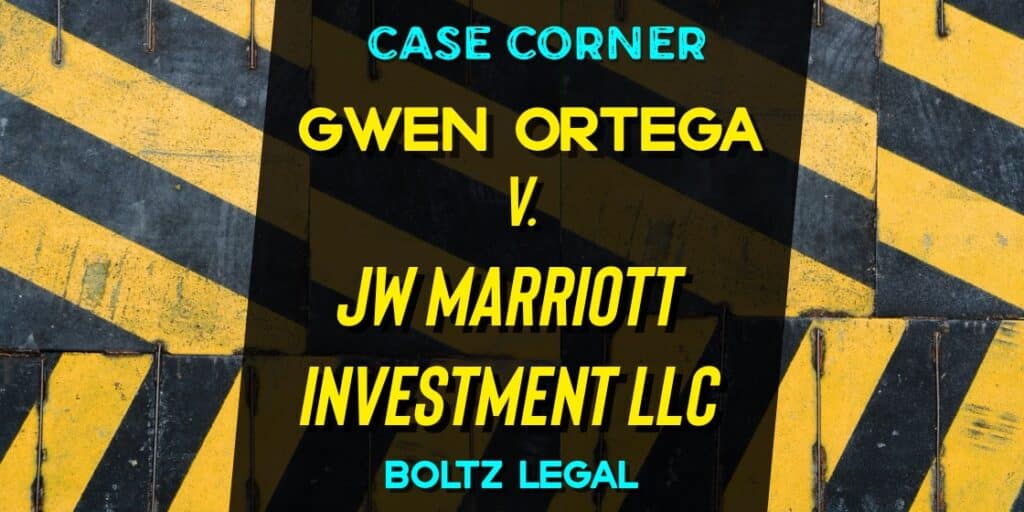Third District Court of Appeal, State of Florida
Case No. 3D23-1916
Opinion Filed: February 26, 2025
Judge: Logue, C.J.
Torts – Premises Liability – Trip and Fall – Open and Obvious Doctrine – Summary Judgment Reversed
Background of the Case
This case examines whether a property owner can escape liability under the “open and obvious” doctrine when a pedestrian trips and falls on an unmarked hazard. The Third District Court of Appeal reversed the trial court’s grant of summary judgment in favor of JW Marriott Investment, LLC, ruling that expert testimony established a factual dispute regarding the dangerousness of the condition.
Factual and Procedural History
1. The Incident
- On January 3, 2022, Gwen Ortega (the “Plaintiff”) tripped and fell in a parking garage at the JW Marriott Miami Turnberry Resort & Spa.
- She fell on a raised and unmarked concrete slab designed to anchor a vehicle gate-arm.
- Ortega alleged the slab created an unreasonably dangerous condition for pedestrians and that Turnberry failed to maintain the premises in a safe condition.
2. Turnberry’s Motion for Summary Judgment
Turnberry moved for summary judgment, arguing:
- The slab was “open and obvious”, meaning Ortega should have reasonably seen and avoided the hazard.
- Ortega had previously parked in the same garage and admitted seeing the slab before.
- There was no evidence of negligence, as the slab was a permanent fixture of the parking structure.
3. Ortega’s Response and Expert Testimony
Ortega opposed summary judgment, presenting:
- Her own affidavit, stating that she did not see the slab before falling and that the slab’s color blended with the ground.
- Expert testimony from Dr. Ronald F. Zollo, a professor of engineering, who opined:
- The lack of a painted edge on the slab made it indistinguishable from the rest of the garage floor.
- The slab’s design violated industry safety standards for pedestrian walkways.
- The hazard was not readily noticeable to a “normally attentive pedestrian.”
4. Trial Court Grants Summary Judgment
The trial court ruled in favor of Turnberry, finding:
- Ortega had actual knowledge of the slab and had avoided it before.
- The slab was not inherently dangerous and was “plainly visible”.
- The mere fact that Ortega fell was not sufficient to establish negligence.
Appellate Court Analysis and Ruling
1. Summary Judgment Standard
The Third District Court of Appeal reversed the trial court’s decision, explaining that summary judgment is only proper when no material facts are in dispute.
“Summary judgment is not designed to resolve disputed issues of fact. It merely serves to identify whether an issue of fact exists that must be resolved by trial.”
— CG Tides LLC v. SHEDDF3 VNB, LLC, 388 So. 3d 1081, 1084 (Fla. 3d DCA 2024)
The appellate court emphasized that all evidence must be viewed in the light most favorable to the non-moving party (Ortega).
2. Landowner’s Duty to Maintain Safe Premises
Florida law requires property owners to fulfill two separate duties:
- Maintain the property in a reasonably safe condition.
- Warn of latent or concealed dangers unknown to invitees.
“Compliance with one duty does not necessarily mean compliance with the other.”
— Rocamonde v. Marshalls of Ma, Inc., 56 So. 3d 863, 865 (Fla. 3d DCA 2011)
3. The “Open and Obvious” Doctrine and Exceptions
Florida law recognizes that landowners are generally not liable for injuries caused by “open and obvious” hazards, unless:
- The hazard poses an unreasonable risk of harm.
- The property owner should have anticipated that the invitee would still be injured.
“A possessor of land is not liable for harm caused by an obvious condition unless the possessor should anticipate the harm despite such knowledge or obviousness.”
— Ashcroft v. Calder Race Course, Inc., 492 So. 2d 1309, 1312 (Fla. 1986)
Here, the appellate court found that the “open and obvious” doctrine did not automatically bar Ortega’s claim, because:
- The slab’s lack of a painted edge may have concealed it.
- The slab’s placement created a foreseeable tripping hazard.
- The expert testimony suggested the slab was not as obvious as the trial court assumed.
4. Expert Testimony Created a Factual Dispute
The appellate court relied heavily on the report of Dr. Zollo, noting:
- The slab’s color matched the surrounding ground, making it difficult to see.
- The lack of a painted warning edge violated industry safety standards.
- The slab posed a hidden danger that an invitee might not reasonably anticipate.
“If the Court is unable to conclude as a matter of law that the open and obvious doctrine precludes recovery, then factual questions of dangerousness and foreseeability remain for the finder of fact.”
— Lotto v. Point E. Two Condo. Corp., 702 So. 2d 1361, 1362 (Fla. 3d DCA 1997)
Since Dr. Zollo’s testimony raised legitimate concerns, the court ruled that a jury should decide whether Turnberry was negligent.
Final Judgment
The Third District Court of Appeal reversed the trial court’s grant of summary judgment, ruling that:
- The “open and obvious” doctrine did not automatically bar Ortega’s claim.
- Expert testimony raised factual disputes regarding the dangerousness of the condition.
- Ortega’s case should proceed to trial, allowing a jury to determine:
- Whether Turnberry failed to maintain the premises in a safe condition.
- Whether Turnberry should have anticipated that guests would still be at risk despite the slab being visible.
Key Takeaways: Premises Liability and Open and Obvious Hazards
- Landowners must keep premises safe, even if a hazard is visible.
- “Open and obvious” conditions do not automatically preclude liability.
- A property owner can still be liable if a hazard poses an unreasonable risk of harm.
- Expert testimony can create factual disputes that must be resolved at trial.
This decision underscores that summary judgment is improper when expert testimony raises questions about the dangerousness of a condition, ensuring injured plaintiffs have a fair opportunity to present their claims before a jury.
Todays Insight
“Just because you can see a danger doesn’t mean it shouldn’t be fixed.”
— Benjamin Franklin
Even when hazards are visible, businesses and property owners have a duty to make their premises as safe as reasonably possible.

